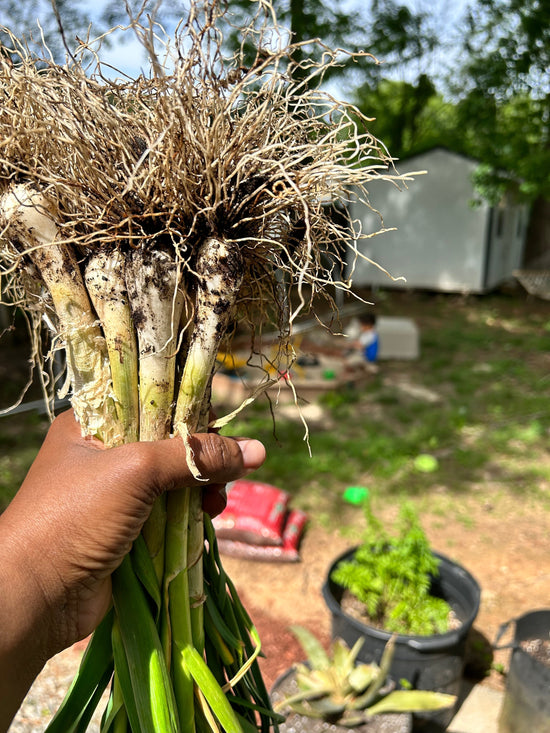Over time the Black community at large has forgotten how to live with and from Earth. Whether through fear or greed or confusion, we’ve given up our powerful legacy. To be fair, my aspirations while growing up smelling manure in my country California cow town was not to raise cows. I associated raising cows and my high school “grower” program FFA (Future Farmers of America) as an annoying reminder of my connection to the institution of slavery and I wanted nothing to do with it. In fact, I wanted the opposite. I wanted a cozy desk job with a salary and project opportunities hinted at me by management. A nice building to work in every day. My own personal chosen enslavement.
The corporate game is to strategize and manipulate for the dollar - so both I, and the company I worked for, could make a whole lot of it. And I did. And once I read through it, I eventually hated it. All the while I allowed the murky cloud of subjugation of my ancestors and the culture they built to destroy the connection to the Earth that held me.
I did myself a huge disservice because the peace I feel in nature now is unprecedented.
What’s more unfortunate? Black men and women of the past, our ancestors, sought out open land to escape prejudice and racism, to find peace and work for themselves and their families. In hindsight, I realize that I turned my back on the basics of my culture, passed down through organizing and saving coins in old tin jars and under mattresses, and rebuilding after what you created was destroyed by a jealous racism or the system that enables those characteristics while promising much and giving loose crumbs, and only when it benefits the system.
What we have learned over the past 250 years of legal enslaved, oppression and manipulation for our labor and culture is that living in the dominant culture steeps the soul in greed, cruelty, and capitalist ideals that extract labor, to some degree, from all areas of life, and in every way possible. Is it just my social media algorithm that makes me think there is a collective whisper getting louder, encouraging the rest of us to revise the “American Dream” and live like our people did before when they could? With autonomy. On the land.
We are natural beings living on a finite natural planet, gifted with the opportunity to give back to it by the indigenous peoples of lands all around the world. We’ve taken the wrong path for long enough. Not through years of lazy recycling as the culture will have you think (though recycling is another corporate created activity designed to put the onus on consumers; guilting us about our consumption while simultaneously promoting overconsumption), but by our collective negligence to learn to give back to the land we commute on, hike through, fly over and road trip across. Feeding it back what we take from it. Creating compost piles.Throwing fruit, nuts and seeds back to Earth. And giving them the pleasure of doing what they do best. Grow.
Through this act of giving back we develop new relationships. Planting flowers, grasses and trees or starting a garden. Welcoming pollinators to spaces not infested with pesticides and remembering how to have them around without feeling a threat to our lives. Discarding the dead and allowing time to decompose and prepare for life again. These are our love languages to Earth and it’s a language we all speak.
A very successful thing this system has done to communities of color is to quietly dare us to embody a stereotype. Don’t get caught loving chicken or watermelon too much or trying to get a deal on a purchase or you’re instantly tossed into the bucket of just another typical poor Black person. To be honest, this is a trigger point for many of us - myself included at many times of my life. I craved to be perceived like those succeeding in the dominant culture. Like middle class corporate white folks. The standard. We want equality but we are losing teeth fighting a battle for equity that is impossible for us to win. The easy blame to caste is class or more obviously, our skin tone, challenging our proximity to whiteness.
Yes, we want the degree (Black women’s excellence tends to earn us many), we want the well paying job, we want the entrepreneur title making 6 figures. We want to fit into American society. But alone, each of these activities is extractive; stripping from nature and Earth's finite resources. Because in pursuit of these western symbols of success, we become resource-centered and resource-reliant. In pursuit of more money, we lose the time and the energy to focus on how to keep ourselves in a balanced state. We are, therefore, in no energetic shape to nurture the planet; to inspire her to turn for another 100,000 years without kicking us the hell off. Instead we pursue more: more food, more cocktails, more petty cash, more clout; even at the expense of our own health, relationships, and our lives.
I’m not here to place blame because the way we live when we don’t think critically about how we’re living is no fault of our own. If you grew up in poverty or with less, naturally you’ll crave, and fight, for more. Similarly, if you grew up in some smelly cow town avoiding main street to save yourself from the stench of livestock, naturally, [some] will search for other, more luxurious paths of success.
But as we see when we traverse across state lines to attend any earth-focused or grounded tent music festival or gathering, when we are closer to the land, when we ground ourselves in the dirt, when we can identify and appreciate nature’s goodness either by foraging or tending the land - we are happier. We are more fulfilled. We are less pressed about what we don’t have or how much more we need.
Black folks have been robbed of our wisdom as it relates to the land. This American soil. Let’s not forget, we are the ones who tended this land after it was unceremoniously and barbarously stolen from our indigenous brothers and sisters. We established ways of innovation and growth like no other. We uncovered and understood how to make lifeless, depleted soil life-giving again, and we, willingly or otherwise, taught these practices to our European neighbors and enslavers. Fast forward generations where descendants of the brilliant enslaved botanist educators all over the south were inspired by violence and a hope for fair wages to move north and west, into concrete ghettos; while others who were actually able to prove ownership to pass down land to their descendants despite sabotage from our nation-state were ignored, violated or worse – we lost the knowledge we adopted as a culture with few allies who could make the difference we needed in mass.
We have earned our right to remembrance. The indigenous community famously has the land take back initiative, a decade-long effort to consolidate and return land to Tribal ownership. It is my opinion that Black people of America and all around the world should engage in mass wisdom take-back where we remember how our ancestors survived and thrived. How they tended and created and took care of one another and the land. On the promise of one day holding it on our own, in sovereignty.
I propose we spend time composting and planting seeds. Not just if we’re locc’d or greet one another with “grand risings”. Corporate bosses and baddies have earned the right to remember too. For those who own a home, grow and compost. If you can afford to hire someone to tend a garden for you, do it. If you’re in a college environment and can petition for a community garden, fight. Grow your herbs in 2 litre bottles and place them in your window for later days. It is time we take back the wisdom of tending this beautiful utopian rock we call Turtle Island or, United States of America. Let’s remember the practices that our granny’s granny’s granny held for safety, for health, and for community.
In the 90s the Black communities had the habit of accusing one another of being “crabs in a bucket”. Neighbors, friends and family have been saying it since I can remember. Decades later, we recognize that trope as another lie fed to us by the dominant culture to protect itself from our collective knowing. Read Collective Courage by Jessica Gordon Nembhard and see just how massive a lie it is. But just like we recognize the scam of capitalism, the way that it convinces us of limited resources - as if there is only so much money and we have to fight to take our piece - we must recognize and remember that this planet, and those of us who inhabit it, are abundant and rich in resources.
There is plenty for everyone as long as reciprocity lives.
Similarly, if we rely on a system that reduces us to what we can create individually, without support or sharing with our neighbors and friends, then yes, we may have to fight to the nail and convince the system that we deserve more than our neighbors and friends do. If we’re being honest though, that’s not an option for many of us. We are naturally community-minded people. We love, and choose through proximity, our neighbors-turned-family, and we cherish our friends. But if we create our own resources: tend the land and share, learn new skills and share, engage each other in community while sharing, we are rich. And that’s not cheeky hyperbole kumbaya crap. It’s facts.
We do not need this system if we invest in one another. If your neighbor has an overabundance of tomatoes, you never have to go to the store for salsa. That’s money in your pocket. That’s time back in your life. True that that example keeps this idea very surface level but you get the gist. If you have a friend who can fix cars and you know how to sew, be creative and trade to save you both the time working for a limited wage to buy more clothes or a new car. Organize a barter and pay no one. When we work in solidarity, we save in every sense of the word. We save each other through community, through love, care and connection. We save money and therefore we save time. We save our children because we have time and money for them and they see us making the time to create lasting communities which they will recreate and strengthen with ease.
We save ourselves because we are no longer tied to a capitalistic organization and whether or not they give us more hours and treat us with respect or extract from the neighborhoods we love. And we save the planet. We feed it more, we listen to it. We get to know it again. We learn its eccentricities just like our Ancestors did. We learn what it needs. We remember these things because these are all things that we know or have known that we have lost. It’s time we take our wisdom back.



